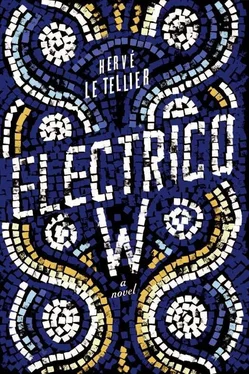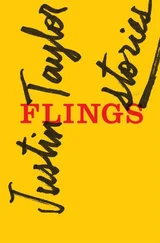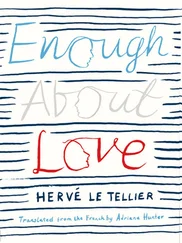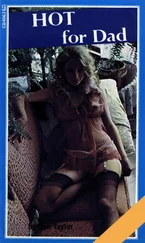She catches the waiter by the sleeve, with all the familiarity of a regular, and orders a coffee.
“Would you like one too? You’re paying for the coffees. It’s just we’ve been here awhile. I’m back at work at four o’clock. And I have some shopping to do …”
“I’m — I’m so sorry. Do you work nearby?”
“Yes, right there,” she says, pointing to a large stone building which looks like a stock exchange.
“At the theater.”
I think I understand now: “So, you’re an actor?”
She laughs. “Yes, yes, an excellent actor. I play the part of the chief accountant every day. They all believe in me.”
She tenses her biceps, Hercules-style.
“Hey, I can’t see your girl anymore. She must have given up. Or maybe she’s taken up another position without my noticing. So, shall we go and do my shopping, then? After we’ve had coffee. Tell me about yourself.”

THE QUARTER OF an hour it takes to drink a coffee is enough to sum up a life — mine, anyway.
If we don’t drown ourselves in details, it gives us a not unhappy childhood in Lyon between a fairly absent father, a manager in a bank branch, and a Portuguese mother who taught primary school; not very turbulent teenage years in Paris; history studies culminating in a master’s degree; and a small gift for writing which earns me first some freelance work for newspapers, then a job with a daily, in the arts department and later the society section. As for love, a few relationships that never lasted, meeting Irene, her rejection which made me crazy about her. Lastly, my father’s suicide, just two months ago.
I didn’t hide anything, embellish or blacken anything either, nor did I try to submerge less glorious episodes in misplaced humor. I also related the one notable event: that lost M16 bullet in Nicaragua. A couple of inches farther to the right and writing my obituary for the paper wouldn’t have been an easy job. I found it soothing to share these confidences sincerely. I also mentioned the novel about Pescheux d’Herbinville that I kept going back to, and my translation of Jaime Montestrela’s Contos aquosos .
“The what? By who?” Manuela asked.
I took out the book; she slipped her sunglasses back onto her head opened the book in the middle, and didn’t land on the best of the tales.
In the town of Chiannesi (Umbria, Italy), on Shrove Tuesday, it was customary for every inhabitant to swap minds with another, women played at being men, children being parents. This swap included animals, and mice could be seen toying cruelly with cats. The municipality brought a definitive end to this custom in 1819, when the swap between cows and flies led to a crisis.
She handed the book back, not very convinced.
“Are you really translating it?”
“Bit by bit. I like unfashionable authors, the ones who failed to produce a major famous work by which they’ll be remembered.”
Manuela smiled. She got it. Yes, I feel a sort of kinship with people who fail. Their wanderings forgive my weaknesses, and I don’t hate the fact that posterity is so unfair toward them. The wrong done them absolves me from my own inability to create, from my laziness and fickleness.
“What about your novel, what’s it about?”
“About the mathematician Évariste Galois and his murderer.”
“Is it a detective story?”
“No, Galois really did exist, he died in a stupid sort of duel between two friends, in May 1832. It’s thought his adversary was called Pescheux d’Herbinville, but there’s another name out there too. In his last letter, written the night before the duel, Galois wrote something wonderful, more about the Republic than mathematics: ‘Remember me, because fate has not given me enough life for my country to know my name.’ And it’s true, his work was found twenty years later. Even so, I’m not getting anywhere with it.”
“Finish it by 2032. Then at least you could make the most of the bicentenary.” She pulled a face, screwing up her eyes. “You’ll notice I’m giving you my most gorgeous smile. She’s still there, your Irene. I can see her again, on the far side of the shop, through the glass. I hope I’m pretty enough to compete with her. I’m not too old for you, am I? I am over thirty, you know!”
“You’re — you’re very …”
“I’m teasing you, and you’re going to say something silly.”
Manuela’s blue dolphin was leaping over the sun. It intrigued me. She saw me looking at her wrist and this made her smile.
“Ah, the dolphin?”
“Yes. It’s very pretty.”
“It’s a kid’s thing. I had it done when I was sixteen, the day after someone very close to me was buried … Slit wrists. I was in a terrible state. I had it put right where the razor would go, so that, if I ever had the same idea, the dolphin would stop me. Dolphins save men. Why not women?”
“I’m so sorry.”
“It was a long time ago. I don’t think I ever really contemplated suicide. I just had my grief inscribed on my skin. An aesthetic act, in a way, almost shameless. Come on, let’s go and do the shopping, and you’re paying for the coffees.”
She stood up, took my arm, and dragged me off.
“It’s not unpleasant having someone at your mercy.”

WE WENT INTO one of the large stores on the rua do Carmo, and Manuela led me straight to the lingerie department on the second floor. In the still prudish Portugal of the 1980s, the range was hardly exuberant, but alluring underwear has never been my specialty. It was an era of women’s liberation, and these emblems of sexual subjection were not part of the seductive palette favored by women I knew.
Manuela couldn’t have cared less. She was enjoying asking my opinion about bras and slips. She liked ochre and cream best, ignoring the blacks and purples that dominated that world. Holding a white silk corset with gray-beige lace edging, she leaned toward my ear.
“I’m going to abandon you, you’ll know why in a minute,” she said, and was just disappearing into a fitting room when Irene appeared.
“You? here? Are you playing the dirty old man in the femme fatale department?”
“I’m with someone. Anyway, you’re here yourself.”
“I saw you … I was over there, in another department.”
She waved vaguely to a place behind her where nothing was going on. A glance toward the fitting rooms betrayed her.
“I didn’t know you liked this sort of thing,” she grimaced, picking up a red leather bustier. “So, would it turn you on if I wore something like this? With garters too?”
I was saved by Manuela’s tousled, smiling face peeping between the curtains.
“Vincent? Come and tell me if it suits me. Miss, this size is really very generous, would you have the next size down, a size four?”
She talked quickly and Irene didn’t speak Portuguese, but she did understand the mistake.
“I … Tell her I don’t work here,” replied Irene, not so much annoyed as disconcerted.
“Oh, I’m sorry, Mademoiselle,” Manuela said in pretty presentable French. “Well, Vincent, are you coming or not?”
I moved closer. She opened the curtain and pulled me by the collar, almost lovingly.
“You speak French?” I breathed.
“No. I have a smattering.” Then she went on more loudly so she would be heard, “So, do you like it on me? Tell me the truth. I don’t look too much like a hooker?”
I tried to stare at the wall but the corset molded her too wonderfully for my gaze not to linger on the unsettling shadow between her rounded breasts, her buttocks, her very long, slim legs. I stammered some sort of reply and she whispered, “How did you like the bit about the size four? Brilliant, wasn’t it? Okay, you’ve fed your eyes long enough, you great pervert.”
Читать дальше













